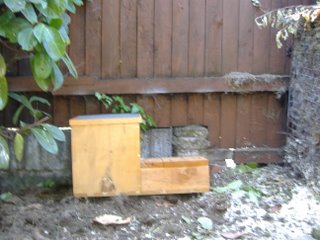This week I got a small insight into the way it must feel to be an editor. I read for the
Romantic Novelists’ Association New Writers’ Scheme and this week I’ve been concentrating on the scripts that have been sent to me and so have been waiting while I finished the book formerly known as The Second Sicilian and now acquired as
The Sicilian’s Red-Hot Revenge. So I’ve had my ‘critiquer’s hat’ on – which is rather similar to an editor’s hat.
I don’t often see my job from an editor’s point of view. For a writer, an editor is a necessity. I’m always worried when an author - and author says something on the lines of ‘Oh I don’t need to be edited any more.’ We all need that objective eye that looks at our work from the perspective of distance. That sees whether we’ve made our characters believable, likeably, sympathetic and above all, consistent. An eye that notes all the knots and tangles in a conflict and makes sure that we’ve worked them all out in a way the comes from the characters, that can see a sagging middle and suggest ways to deal with it. That can – in editorspeak – ‘Tweak’ the book from the slightly rough diamond we may have created into the brilliant, dazzling solitaire that we were aiming for. We can all get too close to a book, to see in it what we thought we were saying, what we meant to say and not actually recognise quite what we did say. And an editor is there to see what the words we’ve put on paper actually say – or don’t say if we haven’t made it clear.
A good editor is a bonus to an author. Editors are trained to be objective but they are human – they don’t always ‘get’ an author’s individual voice and so sometimes the editor/author ‘fit’ isn’t the best it can be. Some years ago, when I was at the start of my writing career, a very much established author and wonderful writer called
Elizabeth Oldfield gave me some great advice.
When she got an letter from her editor, with a request for revisions, she said, she always did 50% without questions – to show that she was professional and cooperative. She discussed, debated, did the other 50% in a different way to prove that she was independent, individual and the creative one!
It’s advice that stood me in good stead over the years as I’ve worked my way through – let me see - Mary, Karen, Mary again, Luigi, Cath, Linda, Marysia, Ceri, Suzanne, Kate, Tessa , Kim and Maddie -
Phew! I’ve been through that adjustment phase with a new editor more times than I care to remember and sometimes it’s worked wonderfully well and other times – no, best not to go there . . .
An editor who is a not quite ‘comfortable’ fit can try to angle your work in a direction that is currently fashionable but not really ‘you’. One who prefers a particular style of writing, of characters, of books, can, perhaps without meaning too, emphasise things in your work that appeal to her/him and throw the balance of what you actually write of centre. A lot of new writers tend to feel – I know I did – that an editor’s comments are carved in stone and must be followed to the letter. The truth is that it is your book and as long as you address the problem the editor as spotted you can deal with it in your own way - if necessary a different one from the one she suggested. You learn to work with your editor – not work for her,
An editor who not only ‘gets’ but sympathises with and loves your voice is a very special gift – someone who does all that and has read all your backlist – and quite possibly knows it just a little but better than you is truly spectacular and just a little scary. I have an editor like that at the moment. Someone I feel looks at my work in almost the same way that I do – but with added cool objectivity so that when she comments she does so from a position of both being totally caught up in the world I have created and from the intelligent critic who wants this book to be the best it can possibly be. That sort of editor brings out the best in a writer because they never, ever want to disappoint or even turn in something ever so slightly 'not quite right.'
And that position is the one I try to work from when I’m reading NWS scripts. I know which types of romance I prefer to read. The ones I prefer to write. The types of heroines I find appealing, the types of heroes who are heroic to me – and the ones who very definitely are not. But I need to try and put that aside and work with the manuscript I’ve been sent – the voice of the writer who has created it – and the world she has created. I need to see if that works. If the characters are believable, if the motivations for their actions convince me. I need to look at paces, emotional punch, dialogue . . .
It’s a challenge and it takes time and concentration. I need to keep that objectivity in place and at the same time - perhaps more so than any editor, I have to remember the person who has worked hard to create this script and send it to the scheme. I remember how it felt to be a newbie, a wannabe, starting out. I’ve kept my first ever submission to HMB to remind me of how bad I once was and show me how far I’ve come. I know that if I’d sent that in to the NWS then a critique of it would have had to slash and burn to be truly honest - and to be of any help. So I try to offer the best advice but I try to do it a way that will make the writer feel I’m offering help not setting out to destroy them. They may never ever achieve publication but they have worked hard, they have done what so many people tell me they are going to do – but never actually sit down to do it – they have written a complete book. Good or bad, with potential, or totally lacking any hope, they have completed 55,000 words of a story with a beginning a middle and an end – and that takes determination and commitment. I want to give them advice that if they absorb it, then use that determination and commitment, they might move on to the next stage in their writing.
They might also be able to use it to polish that rough diamond manuscript to the stage where an editor will want to buy it. I’m really thrilled when I hear that someone whose manuscript I’ve critiqued has gone on to have their first – and more - books accepted and put on sale. It’s happened four times now - four brand new novelists whose careers I was able to help along the way just a little. And I’m hoping for more. Really hoping – there’s one script this time where my fingers are tightly crossed . . .
But I only do this every once in a while. At this time of year usually, when the NWS scripts come in. Editors do it all day every day – and my short stint of reading these mss gives me such an insight into their job that I come away with a new admiration for the good ones - and an appreciation of the contribution they make to polishing up the books I’ve written.
Doing my own bit of editing this way also sharpens up my own writer’s skills. Reading scripts that don’t work, having to explain why, suggesting approaches that might help, makes me look at my own work in a different, a sharper sort of light. It makes me realise how I approach things and how I work to avoid the pitfalls the New Writers fall into. Writing and editing are two very different skills, but in good hands they combine to the best possible effect.
So although I’ve 50 titles behind me, a writing career of 20+ years, and although I may sigh and moan when a revisions letter comes through, I’m deeply grateful for the fact that I do have an editor, someone to look at my work from that objective distance that I know has to go into the critiquing I’ve just been doing.
If you want to know more about the RNA’s New Writers’ Scheme – you can find the details
here. The scheme only has 200 places and is closed for this year. But you can apply to join in January 2007.




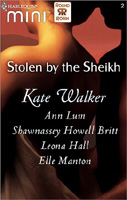

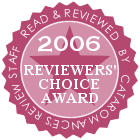

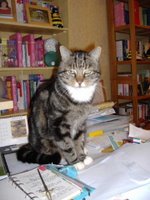
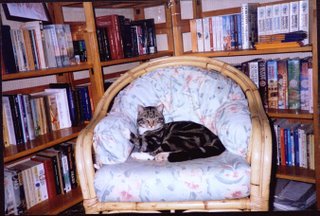



 style.
style. 
